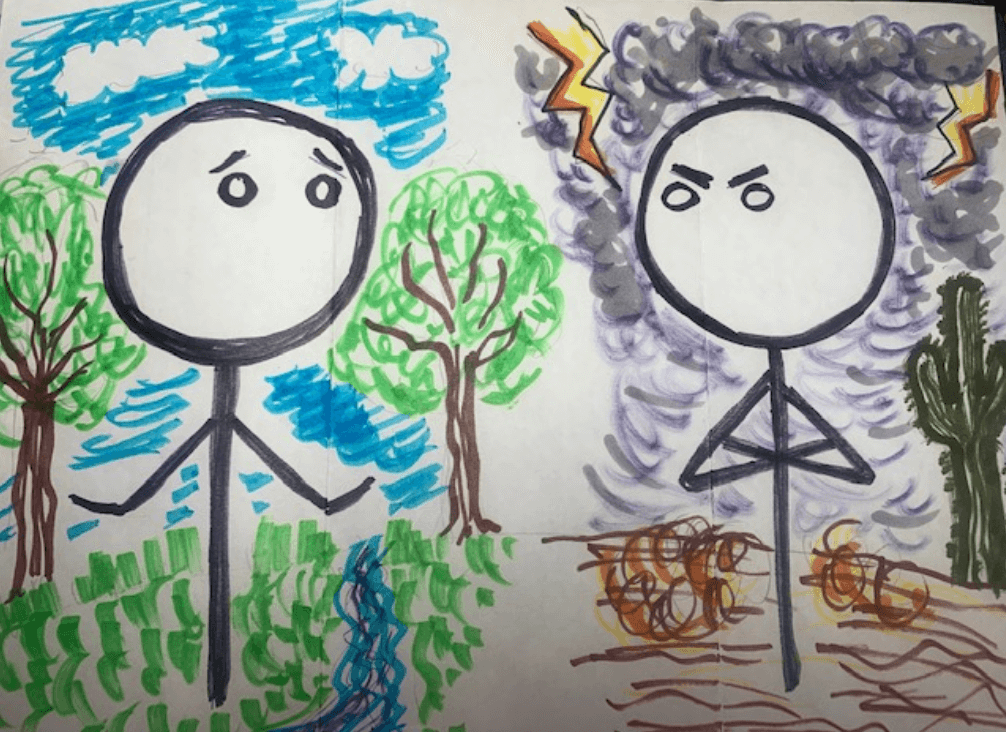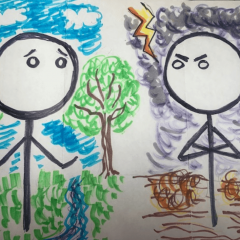humility
Feeling Uncomfortable?
31st Sunday Ordinary Time
Fr. Mark Gatto
Preached: November 5, 2023
Are you feeling comfortable right now? I am not speaking about being comfortable in the new pews! After listening to these passages from the Scriptures, especially the words of Jesus in the Gospel, we should probably be feeling uncomfortable. We often think of the Bible as something that brings us comfort, but if we are reading it properly then sometimes it should be something that makes us uncomfortable.
As a priest, the words of Jesus about the Scribes and Pharisees make me uncomfortable. Jesus says, “do not do as they do, for they do not practice what they teach.” “They do all their deeds to be seen by others.” “They love… places of honour at banquets,… to be greeted with respect…”Do these words apply to me as a priest?
Pope Francis has spoken often about the harm to the church of clericalism. What is that? When one sees himself as superior to the people, sees himself as being over them. When he speaks down at the people, putting burdens on others. The priesthood must be rooted in a servant and humble mentality. Jesus says, “the greatest among you will be your servant.” “Whoever humbles himself will be exalted.” This must be the vision of any Catholic priest.
But, these words of Jesus do not apply just to priests today. They should make many of you uncomfortable. It is a vision of authority and leadership. Anyone in a position of authority should be challenged by these words of Jesus.
Who might this apply to? Teachers, parents, Police officers, CEO’s, politicians. Anyone in any position of authority needs to see themselves not as being over others, but as servants. Anyone in any position of authority needs not to desire to be exalted, but rather to serve others with humility.
– Teachers are not over their students, they are servants of their students.
– Parents are not over their children, they are servants of their children.
– Police officers are not over people in the community, they are servants of the people.
– CEO’s are not over the employees in their company, they are servants of the employees.
– Politicians are not over the citizens, they are servants of the citizens.
This Gospel vision of authority is completely different from what we often see in our world.
We are living in a dark moment of history. We see great divisions, we see destructive wars. Whether Russia in Ukraine or now the war in the Middle East, in Israel and Gaza.
In all of these situations, the problem is with the vision of authority. Authority as being over others, power over others, domination of others. Authority that relies on guns, bombs, military spending. Of course, none of this will ever bring true peace.
The only hope for peace is found in the Gospel vision of authority. We need political leadership that embraces a humble, servant leadership. Leaders who do not see themselves over others but as true servants.
We want the Word of God to bring us comfort. But, it is probably more valuable and important when the Word of God make us uncomfortable. Today’s Gospel offers us a vision of authority and leadership rooted in service and humility. It is a vision of authority needed in our world, in our church, in our families, in our communities. Do not desire to be over others, but to serve others.
Praying With Humility

30th Sunday Ordinary Time
Fr. Mark Gatto
Preached: October 23, 2022
There is a story about a monk called Brother Bruno. One night he was at prayer and he was really disturbed by the croaking of a bullfrog. All his attempts to disrespect the sound were unsuccessful so he shouted from his window, “Quiet! I’m at my prayers.”
Now Brother Bruno was a saint so his command was instantly obeyed. Every living creature held its voice so as to create a silence that would be favourable to prayer.
But now another sound intruded on Bruno’s worship – an inner voice that said, “Maybe God is as pleased with the croaking of that frog as with the chanting of your psalms.” “What can please the ears of God in the croak of a frog?” was Bruno’s scornful rejoinder. But the voice refused to give up. “Why would you think God invented the sound?”
Bruno decided to find out why. He leaned out of his window and gave the order, “Sing!” The bullfrog’s measured croaking filled the air to the ludicrous accompaniment of all the frogs in the vicinity. And as Bruno attended to the sound, their voices ceased to jar for he discovered that, if he stopped resisting them, they actually enriched the silence of the night.
With that discovery Bruno’s heart became harmonious with the universe and, for the first time in his life, he understood what it means to pray.
Any true prayer should lead us to unity, with God, with our fellow human beings, with creation, with the entire universe. If I am praying, but separated from my fellow human beings, something is wrong with my prayer. If I am praying, but not one with creation, something is wrong with my prayer.
Jesus describes two men going to pray. One went home justified, the other did not. The pharisee prayed, but in a spirit of superiority, with a lack of humility. In the midst of his prayers, he is looking at other people with contempt, including the tax collector. The tax collector came to prayer in great humility, recognizing himself as a sinner in need of the mercy of God.
Jesus is not fooled by false piety or by superficial prayer.
Jesus is looking for a humble attitude, not judging others, not showing contempt for others.
Our prayer is not about changing the world, not about changing others. Humble prayer is about seeing with the eyes of God, is about feeling with the heart of God.
God loves the universe, sees our fellow human beings with eyes of compassion, with a heart of love.
If I am praying, but I see my fellow human beings with contempt rather than compassion, then there is something wrong with my prayer. If I am praying, but my heart is cold, then there is something wrong with my prayer.
We need to come to God in prayer as the tax collector in the Gospel, “God, be merciful to me, a sinner.” Humble prayer will always leads us to be unity with others, with creation. Humble prayer will help us to see with the eyes of God, feel with the heart of God.
Humble Church, Humble Priests, Humble Catholics

22nd Sunday Ordinary Time
Fr. Mark Gatto
Preached: August 28, 2022
What kind of church is needed today? What kind of priests are needed today? What kind of Catholics are needed today? All of these actually go together. The kind of church we want to be depends on the kind of priests we have and the kind of Catholics that we are.
The speech of Jesus to the Pharisees in the Gospel today could perhaps be something Jesus would say to us in the Catholic Church today. Jesus is speaking to the Pharisees, he sees their pride, their desire to be praised and acknowledged. They want to be put on pedestals and seen as superior to others. Jesus is clear about the importance of humility. A humble way of being in relation to others and to God.
We need a humble church, so we need humble priests, and we need humble Catholics. What will a humble church look like? What will humble priests and Catholics look like?
- Humility always means facing the truth about ourselves. Seeing ourselves honestly.
- Humility means that we see our own sins, our own weaknesses, before we look at those of others.
- Humility means understanding that there is one God, one Messiah, and it is not us. We are not the centre of the universe.
- Humility allows us to serve those that cannot give us anything in return, to serve those who seem unimportant to our world, to serve those who will not even thank us.
- Humility means that we do not see ourselves as superior to others.
- Humility means we do not need to win every debate or argument.
- Humility means we realize that we are not always right.
- Humility means we do not have all the answers.
- Humility means I only worry about how I am seen by God, I do not need recognition or praise from others for doing what is right.
We have a seminarian, William Meehan, with us this summer. As he continues his discernment and formation for the priesthood, there are some things that I hope for him. First, that he is a better priest than me!!! But, seriously, if he is to be a good and happy priest, he will need to avoid wanting to be put on a pedestal, not see himself as more important or holier than others, not think he is closer to God.
A priest is one willing to take a demotion, to get down low to the least within society, who is not looking for praise or honour or recognition. A priest is to be intimately united to Jesus because a priest is to serve the way Jesus did. My hope is that he will be a humble priest. So far, I am glad that I see this humility in William.
As we listen to Jesus speaking to the Pharisees in this Gospel, we should hear Jesus speaking to us as Catholics today.
We need to be a humble church today, so we need humble priests and we need humble Catholics. Sometimes people come to me in confession or spiritual direction and they say that they want to pray for humility. I always smile and warn them about praying for humility, because you might get it!
The challenges the church and priests face in society today due to scandals and criticisms just might be God’s way of forming a humbler church, humbler priests, humbler Catholics.
Just Like Us

22nd Sunday In Ordinary Time
Fr. Mark Gatto
Preached: September 1, 2019
I heard the Story of a priest who was visiting a L’Arche community in Europe. We will call him Fr. Frank. (L’Arche are communities where people with and without intellectual disabilities live, work, learn, and grow together). One of the founders was a Canadian, Jean Vanier. This priest who visited there was not a well man. He was recovering from a nervous breakdown and, although feeling stronger, had not yet regained full health.
On this particular day, the priest who was scheduled to celebrate Mass with the community did not show up. Fr. Frank offered to help. The people gratefully accepted and together they began to pray the Mass. But within a short time Fr. Frank became very nervous and lost all confidence. He stumbled and mumbled his way to the end of the Mass, feeling devastated and humiliated. How upset he was to have let the community down in this simple task! He wanted to run away and hide from the people who saw him in his weakness and helplessness.
After Mass the people came forward and hugged him. They were smiling and crying at the same time. They were saying to him that this was one of the most beautiful Masses they had ever been to! Fr. Frank could not understand their exuberant joy, as he was feeling the opposite.
Resisting their praise, he said, “How can you possibly describe this Mass as you have?” They replied, “But, Father, you are just like us. Thank you!”
These people, so often rejected by society, had recognized something of themselves in this priest as he celebrated the Eucharist. He truly represented Christ among them.
Who feels welcome in our parish, our church? The elderly, those coming on Darts and with walkers, children even when they are distracting, those struggling with mental illness, with depression, people finding life difficult now for various reasons?
Jesus tells the Pharisee that when he gives a banquet he should “invite the poor, the crippled, the lame, and the blind.” This is a symbol of the Kingdom of God, the God who receives all, who welcomes with special care those who seem unable to offer anything in return.
The humility that Jesus speaks about is not about putting myself down, but about raising up others. To be secure enough in myself that I do not need to put others down. Then I can be weak in front of others and others can be weak in front of me. Then we recognize each person as welcomed into the Kingdom of God. If God receives the other, how can we not receive them?
Our parish, our church, should be a community, a home where all feel welcomed, where all of us are able to be weak in front of each other. Where all are then lifted up in the grace and mercy of God.




